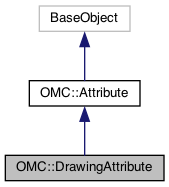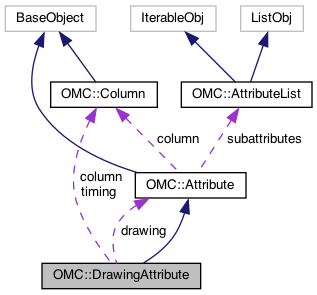
|

|
The attribute wrapper.
This object wraps a single attribute owned by a node. The Drawing attribute provides generic representation for either an Element Attribute when in Element Mode or a Timing Attribute otherwise.
When in Element Mode (OMC::DrawingAttribute::element_mode == True), the drawing is provided by an element object and is sourced from a folder on disk within the project's element folder.
The Element Attribute uses the attached column (OMC::ElementColumn) to provide an element ID and the timing for the drawings. The Element that is linked to the ElementColumn will provide a list of element drawings sourced from the element's folder. The OMC::ElementColumn then provides the timing of this Element's drawings (OMC::ElementDrawing).
See OMC::ElementAttribute, OMC::ElementColumn, OMC::Element and OMC::ElementDrawing for more information.
When in Timing Mode (OMC::DrawingAttribute::element_mode == Frue), the drawing is provided by a TimingAttribute that provides a location, size, suffix and timing for content sourced externally from the project. This content is not sourced from the project's elements folder, and the timing is used to simply target a different source elsewhere or disk.
Public Member Functions | |
| virtual QString | value (int frame) const |
| Get the attribute's value. More... | |
| void | set_localvalue (const QVariant &value) |
| Set the attribute's local value. More... | |
| void | set_value (int frame, OMC::ElementDrawing *drawing) |
| Set the attribute's value as a drawing value at a given frame. More... | |
| OMC::Node * | node () const |
| The node that owns this attributes. More... | |
| virtual bool | unlink () |
| Unlinks a column from the attribute. More... | |
| virtual bool | link (const QVariant &column) |
| Links a column to the attribute, making it animate over time. More... | |
| bool | set_text_value (int atFrame, const QString &value) |
| Modify an attribute with a text value at a given frame. Change an attribute with a text value applied at a specific frame. This provides similar utility as the Javascript libraries available for the application. More... | |
| QString | get_text_value (int atFrame) const |
| Get a text value at a given frame. Retrieve the text value of an attribute at a specific frame. This provides similar utility as the Javascript libraries available for the application. More... | |
Public Attributes | |
| OMC::Column * | column |
| Get and set the column object attached to the the attribute. A column of type 'Drawing' (OMC::DrawingColumn) is expected. More... | |
| QString | column_name |
| Get and set the column name attached to the the attribute. More... | |
| QVariant | element |
| Provides the element connected to the drawing. More... | |
| QString | drawing_type |
| The drawing-type of the attribute. More... | |
| QString | element_name |
| The element name of the element connected to the attribute. More... | |
| QString | timing_name |
| The timing name of the drawing connected to the attribute. More... | |
| bool | element_mode |
| Identifies whether this attribute is in element mode or not. More... | |
| OMC::Attribute * | drawing |
| Provides either the element attribute or the custom-name attribute depending on the active mode. More... | |
| OMC::Column * | timing |
| Provides either the element attribute or the custom-name attribute depending on the active mode. More... | |
| QString | keyword |
| Get the keyword of the attribute. More... | |
| QString | display_name |
| Get the display name of the attribute. More... | |
| QString | type_name |
| Get the display name of the attribute. More... | |
| QString | full_keyword |
| Return the full keyword of the Attribute. More... | |
| bool | dynamic |
| Identifies if the attribute is dynamic. More... | |
| bool | linkable |
| Identifies if the attribute is linkable and can have a column linked to it. More... | |
| AttributeList * | subattributes |
| Get the list of subattributes belonging to the attribute. More... | |
|
inherited |
Get a text value at a given frame. Retrieve the text value of an attribute at a specific frame. This provides similar utility as the Javascript libraries available for the application.
| atFrame | - The frame at which to set the attribute. |
|
virtualinherited |
Links a column to the attribute, making it animate over time.
Links a column to the attribute, if the column is compatible with the attribute type. Also see setting OMC::Column::column with a Column object property.
|
inherited |
| void OMC::DrawingAttribute::set_localvalue | ( | const QVariant & | value | ) |
Set the attribute's local value.
The Drawing Attribute does not provide a local value – this method only exists as a macro for OMC::DrawingAttribute::set_value( 1, value )
| value | - the OMC::ElementDrawing or drawing name to which the attribute should be set at frame 1. |
|
inherited |
Modify an attribute with a text value at a given frame. Change an attribute with a text value applied at a specific frame. This provides similar utility as the Javascript libraries available for the application.
| atFrame | - The frame at which to set the attribute. |
| value | - The new value of the attribute. |
| void OMC::DrawingAttribute::set_value | ( | int | frame, |
| OMC::ElementDrawing * | drawing | ||
| ) |
Set the attribute's value as a drawing value at a given frame.
Sets the value of the attribute to the provided drawing value at the given frame.
| frame | - the frame at which the attribute is set. |
| value | - the OMC::ElementDrawing or drawing name to which the attribute should be set. |
Set a Drawing Value at a Frame
|
virtualinherited |
Unlinks a column from the attribute.
Unlinks any column from the attribute.
Also see OMC::Column::column with property None.
|
virtual |
Get the attribute's value.
Get the attribute's value as a string representing a drawing's name at a given frame.
Provides the value as a string that represents a drawing's name at a given frame.
Retrieve a Drawing Name at a Frame
| OMC::DrawingAttribute::column |
Get and set the column object attached to the the attribute. A column of type 'Drawing' (OMC::DrawingColumn) is expected.
Get the Column Associated with a Drawing Attribute
Set the Column Associated with a Drawing Attribute
|
readwrite |
Get and set the column name attached to the the attribute.
Similar to OMC::DrawingAttribute::column – sets the column attached to the drawing attribute with a string corresponding to a OMC::DrawingColumn name.
See OMC::DrawingAttribute::column for more information.
|
readinherited |
Get the display name of the attribute.
Provides the display name of the attribute. The display name is read only, and is the name of the attribute provided within the GUI to the user.
| OMC::DrawingAttribute::drawing |
Provides either the element attribute or the custom-name attribute depending on the active mode.
The drawing source can be provided from a different subattribute depending on the element attribute's mode. This property provides the corresponding attribute given the element's current settings.
|
read |
The drawing-type of the attribute.
A read only property that provides the drawing-type as a string.
|
readinherited |
Identifies if the attribute is dynamic.
Dynamic attributes are those that are created with scripted access to an attribute and are created dynamically and uniquely for that node. These dynamic attributes are not necessarily standard for the node-type, and can be added or removed from the node on-demand.
See OMC::AttributeList::create_dynamic_attr for more information.
Create a new Double Dynamic Attribute
|
read |
Provides the element connected to the drawing.
A DrawingAttribute has an element associated with it (generally provided via the column). This element property is provided as an OMC::Element object and provides access to the OMC::ElementDrawing and OMC::ElementDrawingList; allowing one to create, modify and remove drawings associated with that element.
List All Drawings Available
|
readwrite |
Identifies whether this attribute is in element mode or not.
When in Element Mode, the drawings will be sourced from the attached OMC::ElementColumn and its element ID. Otherwise, it is in timing mode and the drawings will be sourced from the attached OMC::TimingColumn and a reference elsewhere on disk.
|
read |
The element name of the element connected to the attribute.
The element associated with the DrawingAttribute (often provided via the OMC::Column attached to the attribute) has both a unique ID and a name. This element name is available either through the element property (OMC::DrawingAttribute::element::name) or with this property.
List All Drawings Available
|
readinherited |
Return the full keyword of the Attribute.
All columns can be referenced by their full keyword as this provides the full path to the given attribute on a Node.
Get the Keyword of All Attributes on a Node
|
readinherited |
Get the keyword of the attribute.
All columns are referenced by their keyword when relative to a given parent object. Otherwise, they are referenced by their full_keyword (OMC::Column::full_keyword) property – which contains the full path to that attribute on a given Node.
Get the Keyword of All Attributes on a Node
|
readinherited |
Identifies if the attribute is linkable and can have a column linked to it.
Only some attributes are animateable and accept a column. If a column is set on a non-linkable attribute, an error is thrown.
See OMC::Attribute::column for an example.
|
inherited |
Get the list of subattributes belonging to the attribute.
Provides the subattribute list (OMC::AttributeList) for this attribute, if one is available. Only certain attribute-types are considered complex, and contain subattributes.
Identify if an Attribute has Subattributes
See OMC::Attribute::column for more examples.
| OMC::DrawingAttribute::timing |
Provides either the element attribute or the custom-name attribute depending on the active mode.
The timing and exposure of the drawings can be provided from a different subattribute depending on the element attribute's mode. This property provides the corresponding attribute given the element's current settings.
|
read |
The timing name of the drawing connected to the attribute.
A read-only property that provides the timing name of the attribute. Different DrawingAttribute settings can result in different timing sources.
|
inherited |
Get the display name of the attribute.
Provides the type-name of the attribute. Different attribute-types provide different information to the node and also require different column-types when linked (if linkable).
See OMC::Attribute::column for an example.

